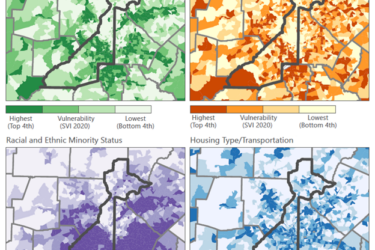
The greatest public health problem is not heart disease. It’s not cancer. And it’s not mental health.
It’s inequality. That’s according to a Canadian health policy analyst quoted by André Picard in a notable series in the Toronto-based newspaper The Globe and Mail.
The Globe‘s Wealth Paradox series, published over two weeks in November, explores how Canada’s increasing wealth gap is reshaping society and putting future generations at a disadvantage. The Globe being a business newspaper, the series makes a business case for taking the threat seriously. It’s full of story ideas that can be transposed onto U.S. turf.
Picard’s piece, Wealth begets health: Why universal medical care only goes so far, dug into the heavy health impact of income inequality despite Canada’s longstanding provision of medical care to all:
Virtually every measure of population health – from child mortality to rates of cancer, cardiovascular disease and traumatic injury – is worse in poor areas than in wealthier ones.
Canadians with an income of $15,000 or less have three times the risk of developing diabetes than those who earn more than $80,000.
Similarly, the risk of dying of cancer within five years of diagnosis is 47 per cent higher in the low-income group than the high-income one.
It is not simply a question of the poor and everyone else. Health tends to increase all the way up the income scale. People living in poor neighbourhoods have a 37 per cent greater risk of suffering a heart attack than those in wealthier areas. But those in middle-income neighbourhoods have a 21 per cent great risk than residents of the richest areas. Most health problems follow a similar gradient.
And what is notable is that, in all these cases, people receive similar medical treatment in all income groups – so it is not access to health care that is the issue, but rather the underlying causes of disease.
In another piece, What growing income inequality is costing Canada’s future generations, writer Barrie McKenna fits health inequality into the bigger picture of global economic and employment trends, concentration of wealth, and growing numbers of people in poverty. “It isn’t just a question of fairness. It’s about the long-term health of the economy, and society,” McKenna argues. “Inequality is also linked to poorer health outcomes and higher rates of crime and social unrest…The result: poorer health for those at the bottom of the income scale – a trend that can exact a heavy economic toll through lost productivity and higher health care bills.”
Praising the series in Columbia Journalism Review, David Cay Johnston says U.S. journalists “would do their audiences a great service if they looked at the tremendous costs of American healthcare relative to other modern countries in terms of its effect on inequality – or most any of the other pressing issues examined in The Globe and Mail’s excellent ‘Wealth Paradox’ series.”
Editor’s note: Be sure to see the new core topic area on AHCJ’s website on social determinants and disparities in health for more ideas on covering the inequities in health care and status.








